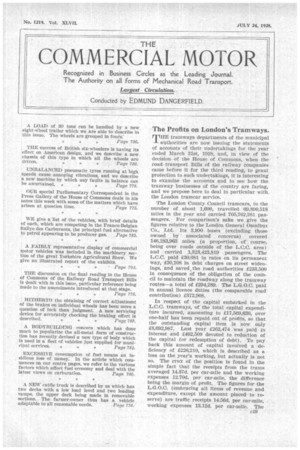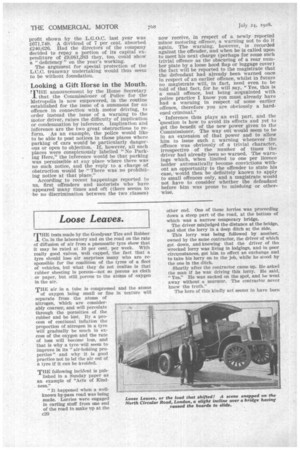The Profits on London's Tramways.
Page 41

Page 42

If you've noticed an error in this article please click here to report it so we can fix it.
mHE tramways departments of the municipal authorities are now issuing the statements of accounts of their undertakings for the year ended March 31st, 1928, and, in' view of the decision of the House. of Commons, when the road transport Bills of the railway companies came before it for the third reading, to grant protection to such undertakings, it is interesting to examine the accounts and to see how the tramway businesses of the country are faring, and we propose here to deal in particular with the London tramcar service.
The London County Council .tramcars, to the number of about 1,600, travelled 69,890,518 miles in the year and carried 705,762,261 passengers. For, comparison's sake we give the figures relative to the London. General Omnibus Co., Ltd. Its 3,990 buses (excluding those owned by associated concerns) covered 146,283,963 miles (a proportion, of course, being over roads outside of the L.C.C. area) and carried 1,323,423,819 passengers. The L.C.C. paid £30,681 in rates on its permanent way, £30,108 in debt charges on street widenings, and saved ,the road authorities £233,500 in consequence of the obligation of the council to maintain the roadway along the tramway routes—a total of £294,289. The L.G.O.C. paid in annual licence duties (the comparable road contribution) £372,908.
In respect of the capital embarked in the L.C.C. tramways, of the total capital expenditure incurred, amounting to £17,569,636, over one-half has been repaid out of profits, so that the outstanding capital item is now only £8,692,987. Last year £262,474 was paid in interest and £492,509 devoted to reduction of the capital (or redemption of debt). To pay back this amount of capital involved a deficiency of £226,210, which is described as a loss on the year's working, but actually is not so. The crux of the position is found in the simple fact that the receipts from the trams averaged 14.37d. per car-mile and the working expenses 12.700. per car-mile, the difference being the margin of profit. The figures for the L.G.O.C. (embracing all items of revenue and expenditure, except the amount placed to reserve) are traffic receipts 14.56d. per car-mile, working expenses 13,12d. per car-mile. The
profit shown by the L.G.O.C. last year was £671,749. A dividend of 7 per cent. absorbed £240,626. Had the director of the company decided to repay a portion of Its capital expenditure of £9,081,383 they, too, could show a " deficiency " on the year's working.
The argument for special protection of the L.C.C. tramway undertaking would thus seem to be without foundation.
Looking a Gift Horse in the Mouth.
rpHE announcement by the Home Secretary _L that the Commissioner of Police for the Metropolis is now empowered, in the routine established for the issue of a summons for an offence in connection with motor driving, to order instead the issue of a warning to the motor driver, raises the difficulty of implication or condemnation by inference. Implication and inference are the two great obstructions to reform. As an example, the police would like to be able to post notices in those places Where parking of cars would be particularly dangerous or open to objection. If, however, all such places were conspicuously labelled ":No Parking Here," the inference would be that parking was permissible at any place where there was no such notice, and the reply to a charge of obstruction would be -" There was no prohibiting notice at that place."
According to recent happenings reported to us, first offenders and motorists who have appeared many times and oft (there seems to be no discrimination between the two classes) now receive, in respect of a newly reported minor motoring offence, a warning not to do it again. The warning, however, is recorded against the offender, and when he is called upon to meet his next charge (perhaps for some such trivial offence as the obscuring of a rear number plate by a loose hood flap or luggage cover) the fact will be reported to the magistrate that the defendant had already been warned once in respect of an earlier offence, whilst in future no magistrate will, in fact, need even to be told of that fact, for he will say, "Yes, this is a small offence, but being acquainted with police practice I know you must already have had a warning in respect of some earlier offence, therefore you are obviously a hardened criminal."
Inference thus plays an evil part, and the question is how to avoid its effects and yet to get the benefit of the new power given to the Commissioner. The way out would seem to be in an extension of that power and to allow him to Issue such a warning whenever the offence was obviously of a trivial character, irrespective of the number of times the driver had already been so warned. The warnings which, when limited to one per licence holder automatically become convictions without an opportunity to the offender to state his case, would then be definitely known to apply to small offences only, and a magistrate would not have to consider whether the defendant before him was prone to misdoing or otherwise.












































































































